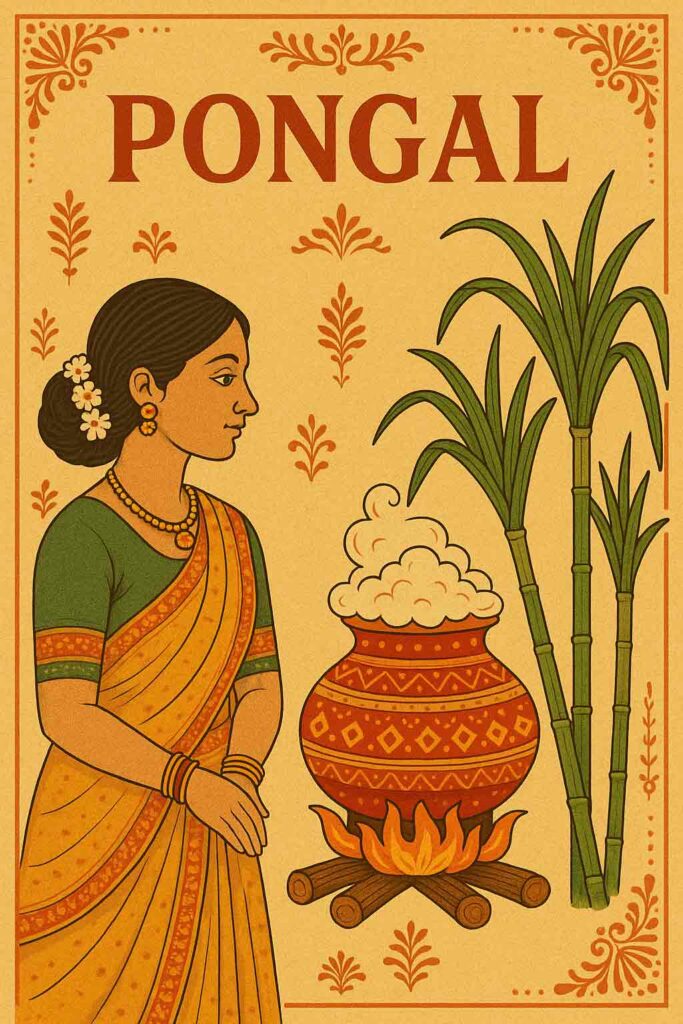Pongal Festival (January 14–17)
A Harvest Celebration of Gratitude and Prosperity

Pongal is one of the most cherished and vibrant festivals celebrated in South India, particularly in Tamil Nadu, marking the season of harvest and thanksgiving. Falling in mid-January, usually between the 14th and 17th, Pongal coincides with the sun’s northward journey—Uttarayanam—and the beginning of the Tamil month Thai. It is a festival dedicated to the Sun God, Surya, who is revered as the source of energy, life, and abundance. Farmers express their gratitude for a bountiful harvest, the cattle that help them till the land, and nature’s generosity. The word “Pongal” itself means “to overflow,” symbolizing prosperity and the abundance of crops, wealth, and happiness in life.
The celebration of Pongal extends over four days, each carrying a distinct significance and set of rituals that blend devotion, joy, and community spirit. The first day, Bhogi Pongal, is dedicated to Lord Indra, the god of rain and clouds. On this day, old household items are discarded, symbolizing the clearing away of negativity and the welcoming of new beginnings. People clean and decorate their homes, light bonfires to burn old possessions, and prepare to embrace a fresh start filled with hope and optimism.
The second day, known as Surya Pongal, is the main day of the festival and is dedicated to the Sun God. Early in the morning, people decorate the entrances of their homes with colorful kolams (rangoli designs) made of rice flour, symbolizing prosperity and warding off evil. The traditional dish “Pongal” is prepared by boiling freshly harvested rice with milk and jaggery in a clay pot, allowing it to overflow as a sign of abundance and prosperity. As the pot boils, family members joyfully shout “Pongalo Pongal!” offering thanks to Surya for his blessings. The dish is then offered to the Sun God along with sugarcane, bananas, and coconuts before being shared among family and friends.
The third day, Mattu Pongal, honors cattle, especially cows and bulls, which are vital to agricultural life. Farmers bathe and decorate their cattle with flowers, paint their horns, and feed them with special treats. The festival recognizes the animals’ hard work in plowing fields and producing dairy, embodying the spirit of gratitude and coexistence with nature. In some villages, traditional bull-taming sports like Jallikattu are organized, showcasing strength, courage, and local traditions.
The final day, Kaanum Pongal, is a day of socializing, family reunions, and community bonding. People visit friends and relatives, exchange gifts, and enjoy festive meals together. Women perform rituals to bless their brothers and families for prosperity and happiness. The day reflects love, unity, and the joy of togetherness that lies at the heart of Pongal.
Beyond its rituals, Pongal carries profound symbolic and cultural meanings. It celebrates the harmony between humans, animals, and nature—emphasizing gratitude and sustainability. The festival also marks the beginning of new agricultural and astrological cycles, aligning human life with natural rhythms. The act of cooking Pongal under the open sky signifies openness to divine blessings, while the overflowing pot represents the overflowing of joy and prosperity in life.
Pongal is not just a festival for farmers but for everyone who wishes to express thanks for life’s abundance. Cities and villages alike come alive with traditional music, folk dances like Kummi and Kolattam, and vibrant decorations. The festive atmosphere is marked by warmth, generosity, and deep cultural pride. Over time, Pongal has transcended regional boundaries, celebrated by Tamil communities across the world, keeping alive the spirit of gratitude, unity, and prosperity.
At its core, Pongal is a reminder that life thrives when we live in harmony with nature and appreciate its gifts. It teaches the timeless values of thankfulness, renewal, and community spirit. As the new harvest fills granaries and hearts overflow with joy, Pongal becomes a true celebration of life, abundance, and the divine bond between humankind and the earth.
